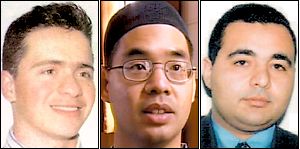In-Depth Coverage of Issues Concerning the Global Sikh Community Including Self-Determination, Democracy, Human Rights, Civil Liberties, Antiracism, Religion, and South Asian Geopolitics

| 'This case is gone,' said Eugene Fidell, a military law specialist who represented Army Capt. James Yee, the chaplain who was threatened with execution before espionage charges were dropped against him. 'There's no ring and no spies. . . . It suggests people didn't do the kind of homework they should have done.' |
| While searching Halabi's possessions, a rookie Air Force investigator drank beer and failed to wear gloves as he opened a box of documents, testimony showed. Then he repacked the box and put on gloves before videotaping his reopening of the box. On several occasions, military officials mistranslated Arabic-language documents, and Air Force agents were found to have been mistaken in asserting that Halabi had sent classified material by e-mail to unauthorized recipients. |
| Asked why the Justice Department was involved in a military trial, he responded, 'That was my question. I have a sense that the leadership of the Justice Department is scrambling, because they don't have any idea about military justice,' [Donald] Rehkopf said. 'It is the political season, and there is no legal basis.' |
| By all appearances, the Pentagon has cooked up an overblown spy case at Gitmo based on clumsy mistakes and bad judgment. This illustrates how actions by a very real enemy, Al Qaeda, have turned us inward, leading us to fight amongst ourselves when we should be battling the foe. Yes, there are Muslims in our midst. Yes, there are Arab-language speakers in our midst. Many are our fellow Americans and fellow airmen. They deserve better treatment than Al Halabi has received. |
| One military official said, 'A lot of the detainees were already in the process of being released' before the C.S.R.T. system was established. Of 43 reviewed by the system, 42 have been found rightly classified as enemy combatants. The one not found so was released earlier this month. Elisa C. Massimino, the Washington director of Human Rights First, said, 'It's fair to question what this [tribunal process] really means when you've also got a parallel system of some kind making the decision that certain people can be released.' |